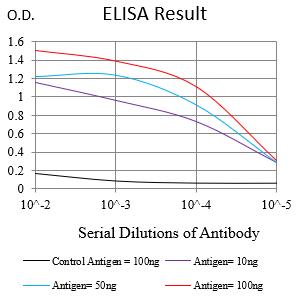
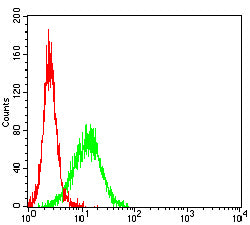
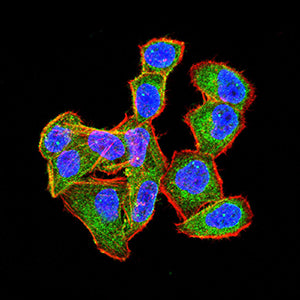
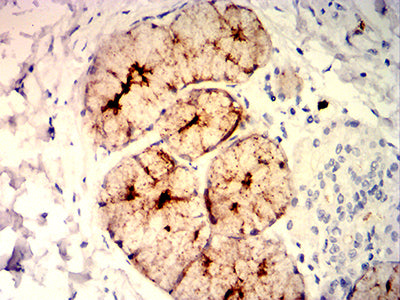
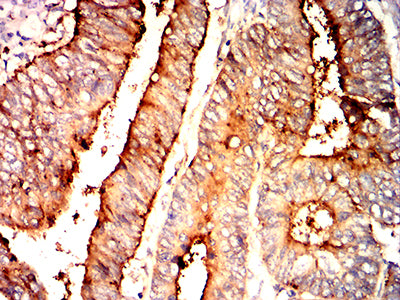
| WB | 咨询技术 | Human,Mouse,Rat |
| IF | 咨询技术 | Human,Mouse,Rat |
| IHC | 1/200 - 1/1000 | Human,Mouse,Rat |
| ICC | 1/200 - 1/1000 | Human,Mouse,Rat |
| FCM | 1/200 - 1/400 | Human,Mouse,Rat |
| Elisa | 1/10000 | Human,Mouse,Rat |
| Aliases | NCA; CEAL; CD66c |
| Entrez GeneID | 4680 |
| clone | 4B9F1 |
| WB Predicted band size | 37.2kDa |
| Host/Isotype | Mouse IgG1 |
| Antibody Type | Primary antibody |
| Storage | Store at 4°C short term. Aliquot and store at -20°C long term. Avoid freeze/thaw cycles. |
| Species Reactivity | Human |
| Immunogen | Purified recombinant fragment of human CEACAM6 (AA: 35-256) expressed in HEK293-6e cells supernatant. |
| Formulation | Purified antibody in PBS with 0.05% sodium azide |
+ +
以下是3篇关于CEACAM6抗体的代表性文献摘要概览:
---
1. **文献名称**: *CEACAM6 as a novel target for antibody-based therapy of triple-negative breast cancer*
**作者**: Oliveira-Cunha M. et al.
**摘要**: 研究证明CEACAM6在TNBC细胞中高表达,开发的人源化抗体通过阻断CEACAM6介导的PI3K/AKT通路显著抑制肿瘤生长和转移,为TNBC靶向治疗提供新策略。
---
2. **文献名称**: *Anti-CEACAM6 monoclonal antibody inhibits pancreatic cancer cell invasion*
**作者**: Duxbury M.S. et al.
**摘要**: 该研究发现胰腺癌细胞中CEACAM6过表达促进侵袭,其抗体通过下调MMP-2活性抑制体外侵袭能力,提示靶向CEACAM6或可成为胰腺癌抗转移疗法。
---
3. **文献名称**: *CEACAM6-specific CAR T cells suppress primary and metastatic colorectal tumors in preclinical models*
**作者**: Zhang Y. et al.
**摘要**: 构建靶向CEACAM6的CAR-T细胞,在结直肠癌小鼠模型中有效清除原发及转移病灶,且对正常组织毒性低,证实CEACAM6作为实体瘤免疫治疗靶点的潜力。
---
**备注**:以上为人工整理的代表性研究方向(诊断标志物、靶向治疗、免疫治疗),具体文献需通过PubMed/Web of Science使用关键词“CEACAM6 antibody”、“CEACAM6 therapeutic”检索最新实证研究。
**Background of CEACAM6 Antibodies**
CEACAM6 (Carcinoembryonic Antigen-Related Cell Adhesion Molecule 6) is a glycosylphosphatidylinositol (GPI)-anchored cell surface protein belonging to the CEACAM family. It plays roles in cell adhesion, immune modulation, and intracellular signaling, often overexpressed in epithelial cancers such as pancreatic, colorectal, breast, and lung cancers. Its elevated expression correlates with tumor progression, metastasis, and poor prognosis, likely by promoting cell survival, inhibiting apoptosis, and enhancing resistance to chemotherapy.
CEACAM6 antibodies are tools or therapeutic agents targeting this protein. In research, they are used to study CEACAM6's biological functions, including its interaction with other adhesion molecules (e.g., CEACAM1 or CEACAM5) and signaling pathways like PI3K/AKT or MAPK. Therapeutically, anti-CEACAM6 monoclonal antibodies (mAbs) are explored for cancer treatment, aiming to block tumor growth, metastasis, or immune evasion. Some antibody-drug conjugates (ADCs) leverage CEACAM6 specificity to deliver cytotoxic agents directly to cancer cells.
Diagnostically, CEACAM6 antibodies aid in detecting protein expression in tissues or biofluids, serving as a biomarker for cancer diagnosis or monitoring. Challenges include ensuring tumor-specific targeting to minimize off-effects and overcoming potential resistance mechanisms. Ongoing studies focus on optimizing antibody affinity, engineering bispecific formats, and combining CEACAM6-targeting strategies with immunotherapy. Overall, CEACAM6 antibodies represent a promising avenue for both understanding cancer biology and developing targeted therapies.
(Word count: 248)
×